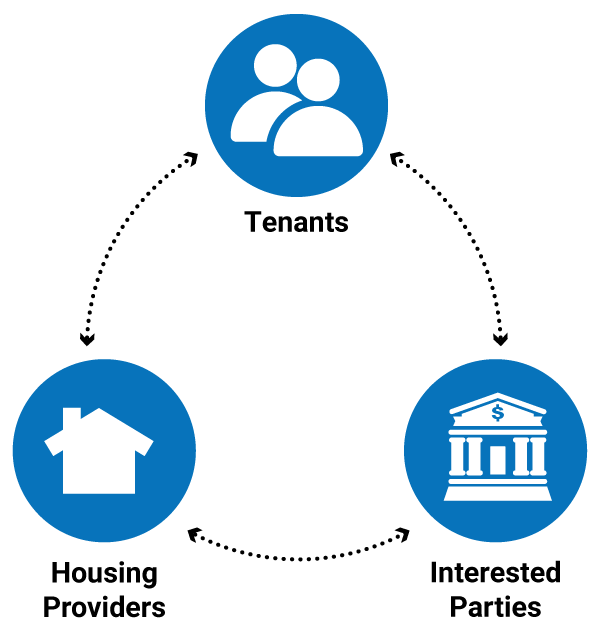Housing Mediation
Need Help With Housing?
Are you or someone you know in a housing crisis? Call 503-655-8575 or visit Coordinated Housing Access (CHA).
Start the Landlord-Tenant Mediation Process
Are you a housing provider, landlord or renter who is struggling with housing conflicts, such as rent payment delays, fines, deadlines, move dates, or other issues?
Our mediators can help you reach solutions to conflicts that can prevent eviction. In fact, four out of five mediated cases stop an eviction.
Fill out our intake form to begin the process to qualify for safe, free, neutral mediation, conflict coaching, resources, referral, and possible assistance with financial help.
To begin the mediation process, please fill out our intake form.
If you need to talk with a coordinator, please call 503-655-8850.
Nobody wants to evict someone and nobody wants to be evicted. Watch this short presentation to learn how a free and effective mediation service in Clackamas County can help you as a landlord, or you as a tenant, find options to resolve your housing issues without having to go through the court system.
Read testimonial about a mutually beneficial mediation process
Don’t wait. Mediate! Landlord-Tenant Mediation Program
Housing providers and tenants can access voluntary and free mediation through Clackamas County’s Landlord-Tenant Mediation Program to address important issues for both sides, from rent payment delays to fines, conflicts, and much more.
No espere. ¡Solicite una mediación! Programa de Mediación para la Prevención de Desalojos
Los proveedores de vivienda y los inquilinos pueden acceder a la mediación voluntaria y gratuita a través del Programa de Mediación para la Prevención de Desalojos del condado de Clackamas para abordar temas importantes para ambas partes, desde retrasos en el pago del alquiler hasta multas, conflictos y mucho más.
About Housing Mediation
Clackamas County provides no cost mediation and conflict resolution services for both housing providers and renters.
 Appropriate for all conflict that impacts the relationship between the housing provider, tenant or anyone else involved
Appropriate for all conflict that impacts the relationship between the housing provider, tenant or anyone else involved- Free of charge for participants
- Can be utilized pre and post eviction filling (in the court system)
- Impartial mediators supporting both landlords and tenants
Our goal is to support all sides of the housing crisis in Oregon. We look to support people having direct and meaningful conversations about what it would take to make the situation work best for all parties. This can look like:
- Agreements around continued housing
- Deeper understanding of each other and the situation
- Working together to find partnerships and resources to get needs met (renter assistance and legal aid)
- Agreement around repayment of rent
- Options for reimbursement
- Finding ways to end housing relationship gracefully (negotiated move-out date)
In the News
- A new day for housing and homelessness services in Clackamas County (Metro News - July 23, 2024)
- Meditation pilot program hopes to prevent mounting Oregon evictions (Dec. 29, 2022 article)
Resources
- Coordinated Housing Access
- Court Evictions Information for Landlord
- Court Evictions Information for Tenants
- Eviction Defense Project
This is for tenants who have a court date scheduled. - General landlord/tenant law information
Video links are on the lower right hand side of the page. - Housing Mediation Flyer
Please share with anyone you think would benefit from the program!- English Tenant | Housing Provider
- Spanish Tenant | Housing Provider
- Chinese Tenant | Housing Provider
- Korean Tenant | Housing Provider
- Russian Tenant | Housing Provider
- Vietnamese Tenant | Housing Provider
- Housing Rights and Resources Flyer (en espanol)
- Landlords Guide to Fair Housing Law
- OSB Lawyer Referral Service
Initial consultations are $35 or less. This is a good resource for landlords since they can’t access Legal Aid. - Reasonable Accommodation and Modification Requests
- Renter’s Handbook On Evictions In Court
- Self-help packets for tenants
- Stipulated Agreements in FED Court
In Partnership With
Housing Rights and Resources 503-650-5750
They are an excellent resource for both landlords and tenants who are attempting to navigate any housing situation. Please feel free to contact them in conjunction with your Housing Mediation needs.
 Translate
Translate






